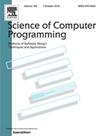Formal specification and validation of the MVM-Adapt system using Compositional I/O Abstract State Machines
IF 1.4
4区 计算机科学
Q3 COMPUTER SCIENCE, SOFTWARE ENGINEERING
引用次数: 0
Abstract
To face complexity and scalability, the design of software-intensive systems requires the decomposition of the system into components, each modeled and analyzed separately from the others, and the composition of their analysis. Moreover, compositional model simulation is recognized as the only alternative available in practice when systems are large and complex, like in the cyber-physical domain, and intrinsically require combining the specification of ensembles of different parts (subsystems). Therefore, the need for simulation engines for composed model execution is getting a growing interest.
Along this research line, this paper presents the results of the compositional modeling and validation by scenarios of an industrial medical system, called MVM-Adapt, that we designed as an adaptive version of an existing mechanical lung ventilator deployed and certified to treat pneumonia during the COVID-19 pandemic.
We exploit the I/O Abstract State Machine formalism to model the device components as separate and interacting sub-systems that communicate through I/O events and adapt the device ventilation mode at run-time based on the health parameters of the patient. An orchestrated simulation coordinates the overall execution of these communicating I/O ASMs by exploiting suitable workflow patterns.
This compositional simulation technique has proved to be useful in practice to validate the new adaptive MVM's behavior and thus to support architects in better understanding this new mode of operation of the prototyped system.
基于组合I/O抽象状态机的MVM-Adapt系统的形式化规范与验证
为了面对复杂性和可伸缩性,软件密集型系统的设计需要将系统分解为组件,每个组件分别建模和分析,并将它们的分析组合起来。此外,当系统又大又复杂时,如在网络物理领域,并且本质上需要组合不同部件(子系统)的集成规范时,组合模型仿真被认为是实践中唯一可用的替代方案。因此,对用于组合模型执行的仿真引擎的需求越来越受到关注。沿着这条研究路线,本文介绍了一个名为MVM-Adapt的工业医疗系统的组成建模和场景验证的结果,我们将其设计为现有机械肺呼吸机的自适应版本,该系统已部署并经过认证,可在COVID-19大流行期间治疗肺炎。我们利用I/O抽象状态机形式将设备组件建模为通过I/O事件进行通信的独立交互子系统,并根据患者的健康参数在运行时调整设备通风模式。经过编排的模拟通过利用合适的工作流模式来协调这些通信I/O asm的整体执行。这种组合模拟技术在实践中被证明是有用的,可以验证新的自适应MVM的行为,从而支持架构师更好地理解原型系统的这种新的操作模式。
本文章由计算机程序翻译,如有差异,请以英文原文为准。
求助全文
约1分钟内获得全文
求助全文
来源期刊

Science of Computer Programming
工程技术-计算机:软件工程
CiteScore
3.80
自引率
0.00%
发文量
76
审稿时长
67 days
期刊介绍:
Science of Computer Programming is dedicated to the distribution of research results in the areas of software systems development, use and maintenance, including the software aspects of hardware design.
The journal has a wide scope ranging from the many facets of methodological foundations to the details of technical issues andthe aspects of industrial practice.
The subjects of interest to SCP cover the entire spectrum of methods for the entire life cycle of software systems, including
• Requirements, specification, design, validation, verification, coding, testing, maintenance, metrics and renovation of software;
• Design, implementation and evaluation of programming languages;
• Programming environments, development tools, visualisation and animation;
• Management of the development process;
• Human factors in software, software for social interaction, software for social computing;
• Cyber physical systems, and software for the interaction between the physical and the machine;
• Software aspects of infrastructure services, system administration, and network management.
 求助内容:
求助内容: 应助结果提醒方式:
应助结果提醒方式:


